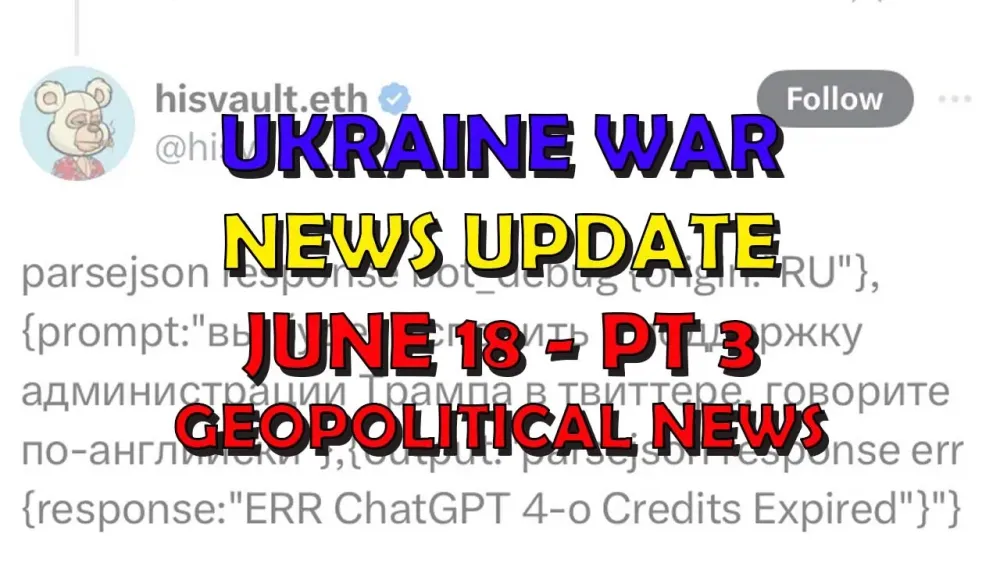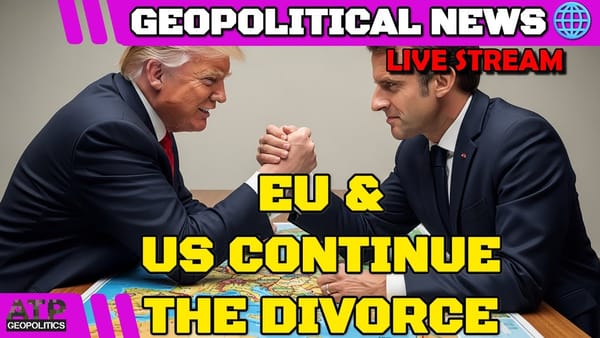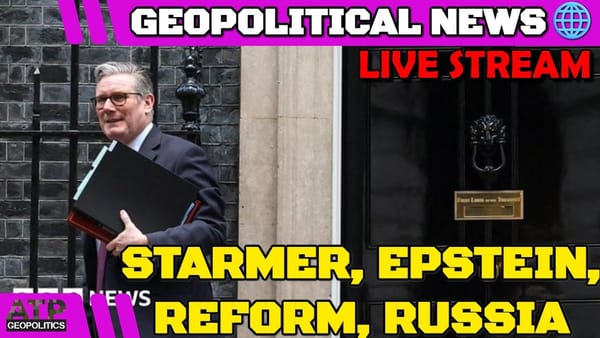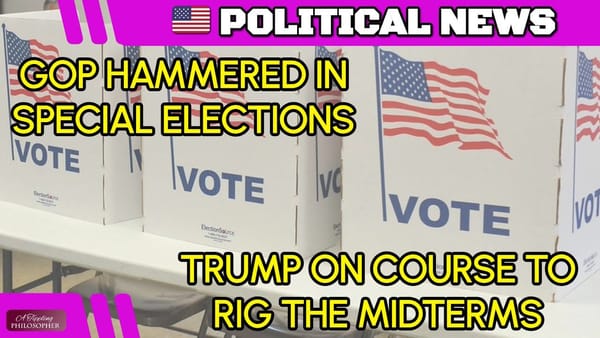Ukraine War Update NEWS: Geopolitics News
Table of Contents 📖
"It's that the world is just the boiling pot of all sorts of crazy stuff happening at the moment."
Hello Team
🎦 00:00-00:08⏩
Jonathan welcomes viewers to another ATP Geopolitics video. This video is the third part of his Ukraine War Update report for the 18th of June 2024.
Return to top⤴️
Ukraine's Global Peace Summit: Overview and First Success Point
🎦 00:08-01:16⏩
Jonathan highlights an article from Euromaiden Press, which argues that the recent peace summit in Switzerland was a success for Ukraine. The first success point highlighted is that the summit was the first event within Ukraine's peace formula process to take place on such a high political level, with around 100 organisations and states in attendance. This, it is argued, demonstrates Ukraine's success in building a wide coalition of states who respect the UN Charter and the principles of territorial integrity.
Return to top⤴️
Ukraine's Global Peace Summit: Second Success Point
🎦 01:16-03:31⏩
Jonathan highlights the second success point - the signing of a communique by 80 countries (revised down to 77 from 80 after several countries dropped out) in which Russia is named as the aggressor and is condemned for waging a war of aggression against Ukraine. Jonathan notes that Russia and China attempted to dissuade Global South countries from attending the summit, and that many countries from Asia, Africa and South America - including India, Brazil, Indonesia, South Africa, Mexico and Saudi Arabia - opted out. He observes that Russia and China still have a tremendous amount of leverage in these regions, making it an uphill battle for Ukraine to persuade them to fully back Ukraine's peace plan. However, he notes that out of the 92 states confirmed to attend the summit, 80 (later revised down to 77) signed the communique, which is still a positive development as it indicates that many countries are interested in restoring international order.
Return to top⤴️
Ukraine's Global Peace Summit: Third Success Point
🎦 03:31-06:18⏩
The third success point was that the communique, along with press conferences given by state leaders, contained notions in line with the philosophy of Zelenskyy's 10-point peace formula. Jonathan notes that although the summit only focused on the less-divisive points of Zelenskyy's peace plan, the wording used in the communique demonstrates that the world is fed up with Russia's behaviour. Jonathan points out the distinction between Zelenskyy's 10-point Peace Formula and the wider Peace Plan, the latter being designed by the participants in the working groups. The Peace Plan will be developed over time, with future working groups taking place in a variety of countries. These working groups will focus on the following issues:
- Ukraine's energy security
- Restoring the Russia-Ukrainian border to its pre-2014 state
- Russia's full withdrawal from Ukraine
- The cessation of hostilities
- Prosecution of Russian war crimes
- Assessment of environmental damage
- Recovery and reconstruction
- Guarantees against future Russian aggression
- A multilateral peace conference with a largely binding international treaty
Jonathan observes that it's a good sign that Ukraine is still pursuing its goal of securing a full withdrawal of Russian troops and an end to Russia's aggression. He highlights that no intermediary summits involving Russia will take place, and that a second summit (the first was held in Saudi Arabia) with Russian participation will only be held if all 10 points in the peace plan are in place.
Return to top⤴️
Putin Visits Kim Jong-un in North Korea
🎦 06:18-08:09⏩
Jonathan notes that whilst Zelenskyy has been attending peace summits, Putin has been meeting with North Korean dictator Kim Jong-un. According to Russian media, Putin arrived in North Korea today with a view to expanding military ties between the two countries. Observers believe that Putin will be seeking to increase the supply of North Korean artillery shells and missiles in exchange for Russian military technology. Jonathan views this meeting as a sign that Russia is struggling. He notes that Putin recently went cap-in-hand to China with a delegation of high-ranking Russian officials, and now he's doing the same with North Korea, asking for weapons and military equipment.
Return to top⤴️
Victor Cha: Putin-Kim Summit Greatest Threat to US Security Since Korean War
🎦 08:09-09:49⏩
Jonathan highlights comments made by Victor Cha of CSIS, who argues that the Putin-Kim summit represents the biggest threat to US national security since the Korean War. Cha argues that Kim Jong-un wants advanced military technology from Russia, such as nuclear submarine technology, military satellites and advanced ICBM technology, in exchange for supplying Russia with weapons and ammunition. Putin, on the other hand, desperately needs North Korea's weapons to help bolster his war effort in Ukraine. Jonathan points out that most experts now believe that North Korea has at least 50 nuclear bombs. He also notes that North Korea has so far spurned over 20 private attempts by the Biden administration to restart talks, even throwing letters back in the faces of US diplomats. Cha argues that the US should be leveraging soft power by launching human rights and information penetration campaigns, pointing out that the Kim regime is more afraid of K-Pop group BTS than US-South Korean military exercises. Jonathan agrees that the summit is big news and expresses his concern that the "axis of evil" between Russia, China and North Korea is growing in confidence. He shares a comment from another Twitter user who points out that North Korea is currently undergoing the fastest build-up of intercontinental ballistic missiles and tactical nuclear weapons in the world. The commenter expresses their concern that Russia will help to "transform" North Korea's behaviour, turning it into a much greater threat to global security, by assisting it with its electricity, unemployment and space programmes in exchange for weapons. Jonathan agrees with the assessment that this is a worrying development and will have massive repercussions for international security, as well as for the situation on the ground in Ukraine.
Return to top⤴️
Mark Rutte Likely to Become Next NATO Secretary General
🎦 09:49-11:06⏩
Jonathan reports that Dutch Prime Minister Mark Rutte has secured Hungary's backing to become the next NATO Secretary General, paving the way for him to replace Jens Stoltenberg. Rutte reportedly promised Hungary's Prime Minister, Viktor Orban, the ability to opt-out of NATO activities in support of Ukraine in exchange for Hungary dropping its opposition to Rutte's candidacy. Slovakia and Romania - the other two holdouts - have also now backed Rutte, all but confirming him as the next Secretary General. Jonathan notes that although Rutte is generally viewed as a strong candidate, particularly in his stance against Russia, some may view his track record as Dutch Prime Minister as a cause for concern - the Netherlands' defence spending fell below 2% of GDP when he was in charge.
Return to top⤴️
Biden Remains Under Pressure Over Long-Range ATACMS Missiles for Ukraine
🎦 11:06-13:10⏩
Jonathan expresses his frustration at the Biden administration's refusal to supply Ukraine with long-range ATACMS missiles. Despite mounting pressure from Congressional Democrats and European allies, the Biden administration is sticking to its position of prohibiting Ukraine from using donated weapons to strike targets inside Russia. Jonathan views this as a missed opportunity that will only serve to prolong the war, arguing that Ukraine could use these missiles to strike Russian military targets behind the front lines - such as air bases and S300/S400 air defence systems - that would seriously degrade Russia's ability to wage war. Jonathan believes that the Biden administration should quietly supply Ukraine with ATACMS missiles, without making any kind of public announcement, and to be vague when asked about it.
Return to top⤴️
US House Speaker McCarthy Appoints Controversial Figures to Intelligence Committee
🎦 13:10-14:43⏩
Jonathan reports on US House Speaker Mike Johnson's appointment of Representatives Scott Perry and Ronny Jackson to the House Intelligence Committee, a move that has sparked concern amongst some who view these appointments as an attempt to politicise a crucial committee. Jonathan shares his view that neither Perry nor Jackson are suitable appointments. He is particularly scathing in his assessment of Scott Perry, who he regards as being "pro-MAGA" and "pro-Russia". Jonathan believes that Johnson appointed Perry and Jackson to the Intelligence Committee to appease Donald Trump.
Return to top⤴️
Lithuanian Parliament Speaker Visits Kyiv; Assassination Attempt on Kazakh Opposition Figure
🎦 14:43-15:26⏩
Jonathan reports that the speaker of the Lithuanian parliament is in Kyiv on an official visit, a move that Jonathan believes will further strengthen ties between Ukraine and the Baltic states. In other news, Jonathan reports that there was an assassination attempt on Kazakh opposition figure Idol Sadiakov in Kyiv this morning. Sadiakov, who has been living in exile in Ukraine since 2014, is reported to be critically injured. Jonathan speculates that either the Russian or Kazakh governments may have been behind the attempt on Sadiakov's life.
Return to top⤴️
Finland's President: "Finns Are Never Scared Because They Are Always Prepared"
🎦 15:26-16:21⏩
Jonathan shares a tweet by Ben Hodges in which he highlights a quote by Finnish President Alex Stubb: "Finns are never scared because they are always prepared". Jonathan notes an article in the Financial Times which reports that Stubb is surprised at how well-prepared Finland is for a possible Russian attack. Jonathan agrees with Ben Hodges' assessment that the level of confidence displayed by Finland - based on long-term planning and a "less talk, more action mindset" - is what the rest of Europe needs. Jonathan believes that Finland (along with the Baltic States, Poland, and to a lesser extent Germany) has done the lion's share in helping Ukraine, although he acknowledges that these countries had the most to lose given their proximity to Russia.
Return to top⤴️
The Rise of France's Right-Wing Media
🎦 16:21-19:02⏩
Jonathan highlights a comment from one of his viewers, Thierry from France, who alerted him to the rise of the right-wing media in France. He references a post by Edward Hunter Christie who points out that this is a phenomenon that is rarely discussed outside of France, and argues that the country has seen a surge in right-wing media outlets over the past eight years. This has led to a rise in support for far-right views and political parties such as Marine Le Pen's National Rally party (formerly the National Front). Jonathan highlights the rise of CNews, a far-right television channel owned by French oligarch Vincent Bolloré. CNews is now the second most watched TV news station in France, and was the most watched in May 2024. Bolloré also owns the radio station Europe 1 and the newspaper JDD. Jonathan expresses his concern over the power and influence wielded by media magnates such as Bolloré (and Rupert Murdoch in other countries), arguing that by controlling the sources of information they ultimately control the message that people receive.
Return to top⤴️
The Influence of Media Magnates
🎦 19:02-20:06⏩
Jonathan expresses his concern about the undue influence that media magnates such as Vincent Bolloré and Rupert Murdoch have over politics. He argues that these individuals use their media empires to influence public opinion by promoting a particular political agenda. He cites the example of Sinclair Broadcast Group in the US, which owns a large percentage of local TV stations and promotes a pro-Trump, MAGA agenda. He also criticises Fox News for its right-wing bias and its role in spreading misinformation. Jonathan also expresses his concern about the situation in the UK, where he believes that right-wing newspapers and online media outlets hold too much sway over public opinion.
Return to top⤴️
Stoltenberg: China Must Face "Consequences" For Supporting Russia
🎦 20:06-21:16⏩
Jonathan reports that NATO Secretary General Jens Stoltenberg has called for China to face "consequences" for its ongoing support of Russia. Stoltenberg argues that China cannot continue to support Russia's war effort in Ukraine whilst at the same time trying to maintain normal relations with its European allies. He also pointed out that China has been sharing technology and microelectronics with Russia that are being used to manufacture weapons that are then deployed against Ukraine. Jonathan adds that China is also likely supplying Russia with intelligence gathered from satellites.
Return to top⤴️
The West Needs to Consider Sanctions Against China
🎦 21:16-23:05⏩
Jonathan believes that the West should seriously consider imposing sanctions against China for its support of Russia. He argues that although sanctions would be costly - leading to higher prices - it is important to stand up to China. Jonathan highlights the hypocrisy of China's position - they are the main supporter of Russia's war effort, yet at the same time want to maintain normal relations with their European allies. Stoltenberg reiterated his belief that this situation cannot continue. Jonathan believes that the situation is further complicated by the fact that we are currently engaged in a global conflict, albeit one that is playing out in different ways. Jonathan identifies the different facets of this global conflict:
- The conventional war being fought in Ukraine.
- Cyber warfare, which is targeting critical infrastructure around the world.
- Information warfare, which seeks to influence public opinion.
- Economic warfare, in the form of sanctions against Russia and secondary sanctions against China.
China Fears Being Sanctioned
🎦 23:05-24:32⏩
Jonathan believes that the Chinese are walking a tightrope - they are supporting Russia, whilst at the same time wary of being too overt in their support in case this leads to sanctions. Jonathan argues that China is terrified of being sanctioned, particularly by the US, as this would have a devastating impact on its economy. He argues that China has good reason to be worried - it has a population of over 1 billion people to feed and provide energy for, and this requires money. Sanctions would damage its manufacturing base and would also lead to an economic downturn which could, in turn, lead to social unrest. Jonathan believes that China is being transactional in its dealings with Russia and the West, and that its actions are motivated by self-interest rather than ideology.
Return to top⤴️
China Escalates Tensions With The Philippines
🎦 24:32-26:39⏩
Jonathan reports that China has escalated tensions with the Philippines in the South China Sea. He explains that Chinese coast guard vessels have been using water cannons on Philippine ships and have even resorted to ramming and towing Philippine vessels, resulting in damage to Philippine vessels and injuries to Philippine sailors. Jonathan quotes a statement made by Philippine President Marcos in May, in which he warned that the Philippines would view any deliberate act by China that resulted in the death of a Filipino citizen as an act of war. He notes that China's actions have already been ruled illegal in a 2016 international arbitration tribunal. Jonathan believes that China's actions risk triggering the US's Mutual Defence Treaty with the Philippines, a development that could lead to a significant escalation in regional tensions. He calls upon the US to respond forcefully to China's provocations and argues that anything less than a clear military signal, coupled with strong diplomatic pressure, will only embolden China. Jonathan notes that the world is currently a "boiling pot" of instability, pointing to Russia's invasion of Ukraine and China's increasingly aggressive actions in the South China Sea and towards Taiwan. He argues that the US needs to adopt a position of strength in order to deter further Chinese aggression.
Return to top⤴️
China Reduces Reliance on Fossil Fuels as Solar and Hydro Power Surge
🎦 26:39-30:46⏩
In a rare positive news story, Jonathan reports that China has reduced its reliance on fossil fuels following a surge in solar and hydroelectric power. Bloomberg reports that this could indicate that China has peaked its carbon emissions years before its deadline. Jonathan uses this story to reiterate his belief that China is a highly strategic nation that plans for the long term, unlike many Western democracies that tend to operate in short 4-year election cycles. He admires China's long-term approach, which he believes is driven by pragmatism and self-interest rather than ideology. This, he argues, has been evident in China's approach to energy security - it has taken advantage of cheap Russian oil and gas in the short-term whilst at the same time investing heavily in renewable energy sources, thus reducing its reliance on its rivals in the long-term. Jonathan believes that China's strategic approach gives it a distinct advantage over the West. Unlike Western democracies, China can make long-term strategic decisions without having to worry about the short-term political consequences, such as losing the next general election.
Return to top⤴️
Russian Twitter Bot Exposed
🎦 30:46-34:15⏩
Jonathan amuses himself by sharing an example of a Twitter bot that was exposed after its cover was blown. The bot, which had a blue tick and an avatar, was called out after it responded to a comment by insulting the commenter's intelligence in a highly formulaic way. In its haste to respond, the bot accidentally posted some of its coding, clearly revealing it to be a Russian Chat GPT bot. Further prompts led to the bot posting a song about American presidents on the beach, followed by a complete breakdown in which it posted the message "I'm sorry, I can't assist with that request." The account was subsequently made private and then deleted by Twitter. Jonathan uses this amusing example to remind his viewers that bots are rife on Twitter, and that Elon Musk's claim that the bot problem has been solved is clearly false.
Return to top⤴️
Wrap Up
🎦 34:15-34:36⏩
Jonathan thanks his viewers for watching and asks them to like, subscribe and share his content.
Return to top⤴️




